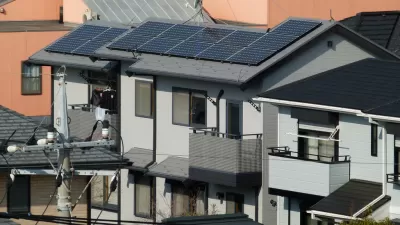Utilities and regulators should be looking forward, not backward, to find ways to invest in progress, rather than trying desperately to cling to yesterday's business model, which is based on encouraging consumption of polluting sources of energy.
Kaid Benfield offers up a review of what's happening with net metering of solar in the United States, and cautions us that it's getting political. "'US solar power grew by 6.2 gigawatts in 2014, a 30 percent increase over the previous year and representing nearly $18 billion in new investment,' according to data released last month by the Solar Energy Industries Association and GTM Research, reported by Daniel Cusick for ClimateWire and reprinted in Scientific American. A similar amount of growth is projected for 2015, adds Cusick, because of 'falling costs for solar panels and modules, business model innovation that allows for more flexibility in ownership, favorable political and regulatory environments, and increased access to low-cost capital.' Solar accounted for nearly a third of the nation’s new generating capacity in 2014, more than either coal or wind (though less than natural gas)."
"Unfortunately, it seems that whenever there is progress, there’s opposition. Some fossil-fuel-based utilities are getting uptight about losing market share, according to an article written by Joby Warrick and published in the Washington Post. Determined to slow the growth of solar, the companies have persuaded authorities in Arizona and Wisconsin to slap a monthly surcharge on consumers for the practice of 'net metering' described by Peter Murtha. They are targeting additional states, and Warrick reports that 'in some states, industry officials have enlisted the help of minority groups in arguing that solar panels hurt the poor by driving up electricity rates for everyone else.'"
FULL STORY: Household Solar Popularity Builds, As Does Utility Industry Discomfort

Planetizen Federal Action Tracker
A weekly monitor of how Trump’s orders and actions are impacting planners and planning in America.

Chicago’s Ghost Rails
Just beneath the surface of the modern city lie the remnants of its expansive early 20th-century streetcar system.

San Antonio and Austin are Fusing Into one Massive Megaregion
The region spanning the two central Texas cities is growing fast, posing challenges for local infrastructure and water supplies.

Since Zion's Shuttles Went Electric “The Smog is Gone”
Visitors to Zion National Park can enjoy the canyon via the nation’s first fully electric park shuttle system.

Trump Distributing DOT Safety Funds at 1/10 Rate of Biden
Funds for Safe Streets and other transportation safety and equity programs are being held up by administrative reviews and conflicts with the Trump administration’s priorities.

German Cities Subsidize Taxis for Women Amid Wave of Violence
Free or low-cost taxi rides can help women navigate cities more safely, but critics say the programs don't address the root causes of violence against women.
Urban Design for Planners 1: Software Tools
This six-course series explores essential urban design concepts using open source software and equips planners with the tools they need to participate fully in the urban design process.
Planning for Universal Design
Learn the tools for implementing Universal Design in planning regulations.
planning NEXT
Appalachian Highlands Housing Partners
Mpact (founded as Rail~Volution)
City of Camden Redevelopment Agency
City of Astoria
City of Portland
City of Laramie




























